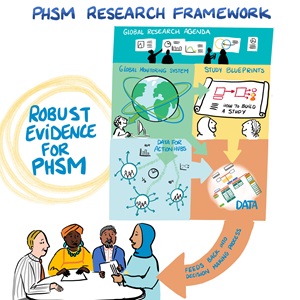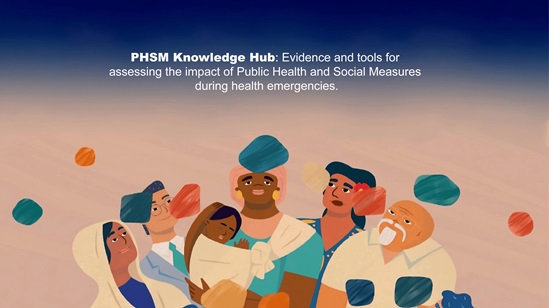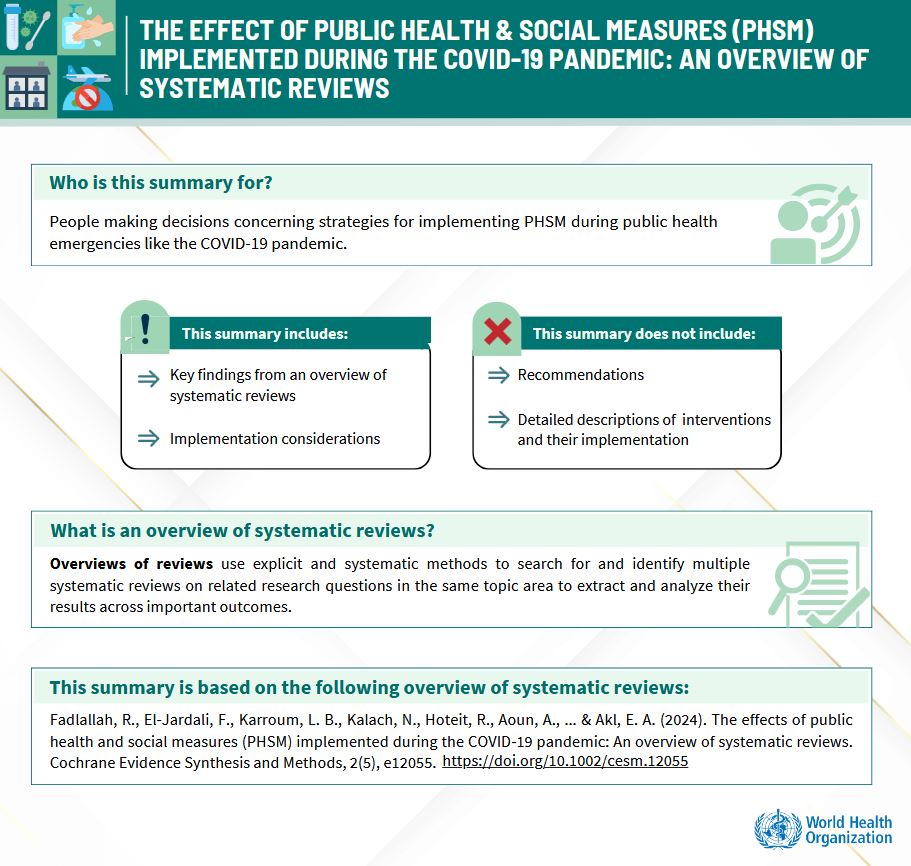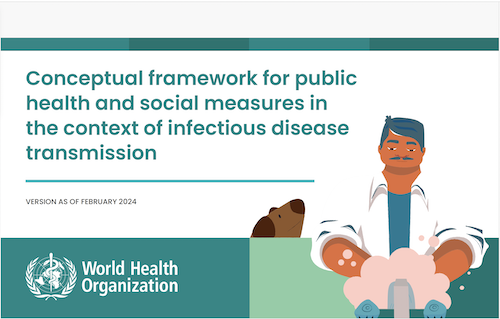Research
Strengthening the evidence base and research capacity on public health and social measures (PHSM)

The unprecedented implementation of PHSM during the COVID-19 pandemic has exposed knowledge gaps about the effectiveness of PHSM, factors influencing people’s acceptance of and adherence to measures and their unintended health and socio-economic consequences. Due to the complex, multi-sectoral nature of PHSM their evaluation poses many challenges, requiring innovative, multidisciplinary and participatory research approaches.
The WHO PHSM Secretariat is working with researchers, communities and policy-makers to strengthen the evidence base on PHSM, make this knowledge accessible to everyone and build capacity in countries to conduct high-quality, decision-relevant and inclusive research to better understand how PHSM work and what impact they have on people’s lives. The research activities inform the development of evidence-based tools and guidance for a more equitable and context-specific implementation of measures during health emergencies.
Photo credit: WHO/Sam Bradd
PHSM Knowledge Hub
The PHSM Knowledge Hub serves as a dynamic, publicly accessible digital platform providing access to ~150,000 research articles and global guidance for 23 priority diseases. The Knowledge Hub leverages cutting-edge AI offering four powerful, interconnected tools:
- PHSM Bibliographic Library ─ a multilingual, multidisciplinary repository of research articles and resources on PHSM,
- Living Reviews ─ AI-assisted screening accelerates and automates evidence review processes, delivering timely insights from the latest research,
- Research Atlas ─ maps research articles against the WHO global research agenda and Conceptual Framework,
- Recommendation Finder ─ a searchable repository of PHSM-related WHO recommendations, technical specifications and enabling functions.
PHSM Evidence Review
In collaboration with partners from academia and national public health institutes, the PHSM Secretariat is conducting a series of reviews to synthesize and analyze the existing evidence on the effectiveness, unintended health and socio-economic consequences, and determinants of adherence to PHSM. The insights from the evidence reviews support the prioritization of future research activities and build the basis for actionable guidance and decision-support tools.
- The effects of PHSM implemented during the COVID-19 pandemic: The overview of systematic reviews was jointly conducted by the Norwegian Institute of Public Health, the American University of Beirut, the Epistemonikos Foundation and WHO. It included 94 reviews synthesizing over 1000 primary studies investigating the effectiveness and unintended health and socio-economic consequences of PHSM implemented in response to COVID-19. The PHSM Secretariat plans to expand the review to other major infectious disease outbreaks.
- Adherence to PHSM during epidemics and pandemics: This systematic review and meta-analysis incorporating data from 248 studies across multiple infectious disease outbreaks such as COVID-19, Ebola and avian influenza analyzes the methodological role of how adherence is measured, the impact of temporal patterns of influencing factors such as vaccine availability, and assesses intervention strategies promoting adherence. The review is conducted together with the Robert-Koch-Institute and the University of Hong Kong.
Global PHSM Research Agenda
The global PHSM research agenda outlines priority areas for research through 2030, organized under six overarching themes, including effectiveness, determinants of adherence and unintended health and socioeconomic consequences of PHSM implementation. The aim is to promote a cohesive and systematic approach to generating robust, multidisciplinary and policy-relevant evidence to inform PHSM decision-making and implementation during health emergencies. Urgent research priorities were initially published in 2023 to guide timely and coordinated research efforts during the COVID-19 pandemic. This was subsequently expanded into a global medium- to long-term PHSM research agenda addressing multiple infectious hazards through 2030.
Setting global research priorities for public health and social measures during health...
Reducing the unintended health and socio-economic consequences of PHSM
While critical for curbing the transmission of infectious diseases during health emergencies, PHSM can have unintended negative consequences. For example, restrictions on travel and trade and business closures can significantly affect societies by increasing unemployment, driving economic downturns and exacerbating poverty. Schools and learning spaces closures can contribute to decreased educational attainment, an increased risk of violence against children, and impaired social development. The implementation of PHSM can also adversely affect health outcomes, including reduced utilization of health services, disruption of routine public health programmes, and declines in mental health and deteriorating health behaviours, often attributed to feelings of loneliness and isolation. People living in conditions of vulnerability, including children, women, older people and workers in informal and precarious employment situations are disproportionately affected by this burden.
To address these challenges and reduce the health and socio-economic burden arising from PHSM implementation, mitigation measures including social protection and community-based initiatives need to be implemented in tandem. The WHO PHSM Secretariat is working with partners including affected communities and the International Labour Organization to (i) build a global evidence base on mitigation measures, (ii) transfer insights to various contexts, and (iii) inform the development of decision support tools for more equitable and balanced decisions about PHSM policy and implementation during health emergencies.
Illustration Credit: WHO/Elkanodata
Role of social protection in reducing the burden of public health and social measures...
PHSM Conceptual Framework
During the COVID-19 pandemic, inconsistencies in defining and categorizing PHSM hampered policy monitoring, research and communication efforts. To address this, WHO and partners developed a conceptual framework to harmonize the understanding and language used to describe how PHSM work during health emergencies. It serves as conceptual basis for a suite of tools to support decision-making, monitoring and research under the umbrella of WHO’s activities on PHSM.
The PHSM conceptual framework aims to:
- Guide coordinated, interdisciplinary research on PHSM effectiveness, unintended consequences and uptake and adherence.
- Facilitate coherent, comparable PHSM policy monitoring.
- Inform equitable, balanced and context specific PHSM decision-making and implementation.
The PHSM conceptual framework has been developed using a consultative process and will be updated on a continuous basis to reflect emerging insights and developments.
Promoting Rigorous PHSM Effectiveness Research
Recent reviews have uncovered a lack of rigorous primary studies assessing the effectiveness of single and combined PHSM for epidemics and pandemics. As this knowledge is critical to inform decision-making and implementation of measures during health emergencies, WHO and external partners including the WHO Collaborating Centre for PHSM effectiveness research are developing master protocols and a related implementation manual designed to accelerate the generation of high-quality and comparable PHSM evaluations prior to and during infectious disease outbreaks.
The master protocols provide a structure to conduct pragmatic, cluster-randomized trials to be adapted to the specific outbreak and contextual situation. Trials based on the master protocols will provide directly applicable randomized real-world evidence of high internal validity. When implemented outside of emergency situations, such as influenza seasons, the protocols’ feasibility can be tested, including optimization of data collection infrastructures. WHO's work to advance rigorous research on the effectiveness of PHSM is carried out through international collaboration, aiming to strengthen national readiness and capabilities to conduct such studies during health emergencies.



